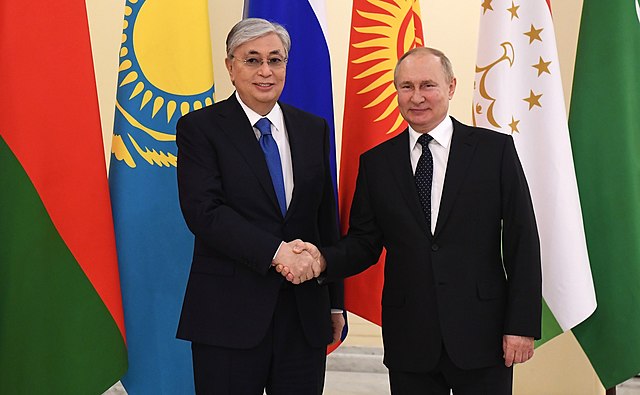 Credit: Presidential Executive Office of Russia
Credit: Presidential Executive Office of Russia
How Kazakhstan Foreshadows Future Russian Actions Abroad
When protests in Kazakhstan turned violent, Russia responded to President Kassym-Jomart Tokayev’s request for assistance by deploying thousands of troops to the country through the Russian-led Collective Security Treaty Organization. This deployment strengthened Tokayev’s grip on power as security forces detained up to 6,000 people and killed more than 150 protestors. Russia has withdrawn as Tokayev’s government appears to have survived the ordeal, but Russia’s rapid intervention in the name of stability provides a glimpse on how Russia will act on its periphery and in areas outside of NATO’s formal control.
Soldiers in Peacekeeping Clothing
President Putin is a known opportunist in foreign policy, eagerly exploiting chaos abroad to exert influence in world affairs. His reasons for such opportunism is both for political gains, namely shoring domestic approval and asserting himself as a world leader, and for strategic ends, such as increasing Russia’s influence abroad at the expense of geopolitical rivals. President Putin’s main options in exploiting these opportunities are both gray-zone warfare – most notably the “Little Green Men” in Ukraine – and a formal military presence in the name of “peacekeeping.” In situations where Russia will use a more formal military presence, Putin often stresses the need to provide security to a deteriorating situation to obtain some form of legitimacy to their international actions. Yet whatever the rhetoric used, it is very likely that these “peacekeepers” are meant to expand Russia’s sphere of influence rather than truly halt open hostilities.
Where Putin May Strike Next
There are significant worries that Russia’s intervention in Kazakhstan foreshadows further action taken against Ukraine. At first glance, this appears to be the case as U.S. intelligence recently reported prepositioned a group of operatives to conduct a false-flag operation in eastern Ukraine. However, Russia invading Ukraine will be costly for Putin militarily and politically, not to mention he can keep Ukraine out of NATO simply through continuing his support for Ukrainian separatists. Russia is also unlikely to take direct actions against NATO members, given such actions could escalate beyond Putin’s control. Instead, Russia will likely intervene in nations that not only face significant unrest, as seen in Kazakhstan, but suit Putin’s political and strategic needs. Russia appears most-likely to intervene in nations that remain formally outside of NATO’s sphere of influence, but these cases will still cause issues for the alliance to deal with. Some examples can include Moldova, with its ongoing frozen conflict with the breakaway region of Transnistria, or Bosnia and Herzegovina where Putin is already exploiting deep ethnic divisions between Bosnian Serbs and Muslims to prevent NATO expansion. It is likely that such interventions can take place in regions where American attention is minimal from the Central African Republic to Venezuela. Yet any intervention will be justified by quick and recent breakdowns in stability whether it is rioting in Almaty or open conflict between Armenia and Azerbaijan.
How the U.S. can Counter Putin’s Next Move
As Russia under Putin grasps any chance to expand its influence, the U.S. can counter its next move by closing any opportunities for Russia to exploit. This doesn’t mean to increase NATO’s membership in Europe or even an expanded military presence in troubled regions, as an official American presence is no guarantee against a Russian presence, as can be seen in Syria. Instead, the U.S. should seek to improve government institutions through transparency initiatives, public diplomacy programs meant to build cross-ethnic ties between feuding groups in these countries, and economic opportunities. This can be done through the U.S. State Department and USAID given their ability to drive economic and political development initiatives in the past, notably in Bosnia and Herzegovina after the Dayton Accords. There is a risk that by building state capacity in nations most susceptible to Russian influence that it would cause Putin to escalate or even provide a false-flag operation to merit an official presence of Russian “peacekeepers.” Yet if little or no significant action is taken to bolster nations that Russia has an interest in, it will provide Putin more opportunities to sow chaos later which will be more costly to reverse or even to contain, as seen with Ukraine. Denying opportunities for Russia to take advantage of chaos abroad will not mean President Putin can be safely ignored or forgotten, but proactively blunting Putin’s ability to exert influence can place the U.S. in a position of strength when confronting Putin on other issues.





